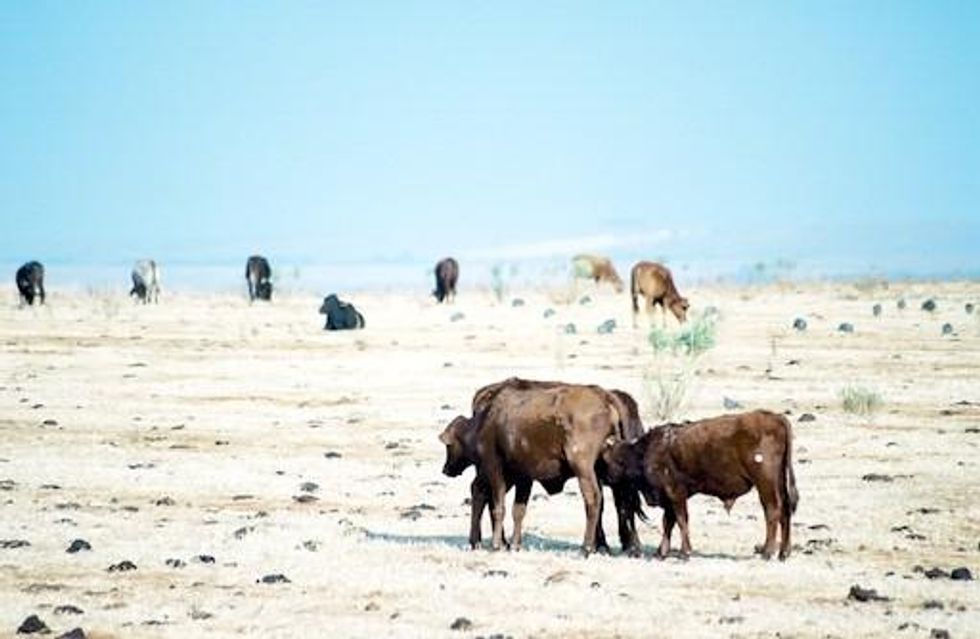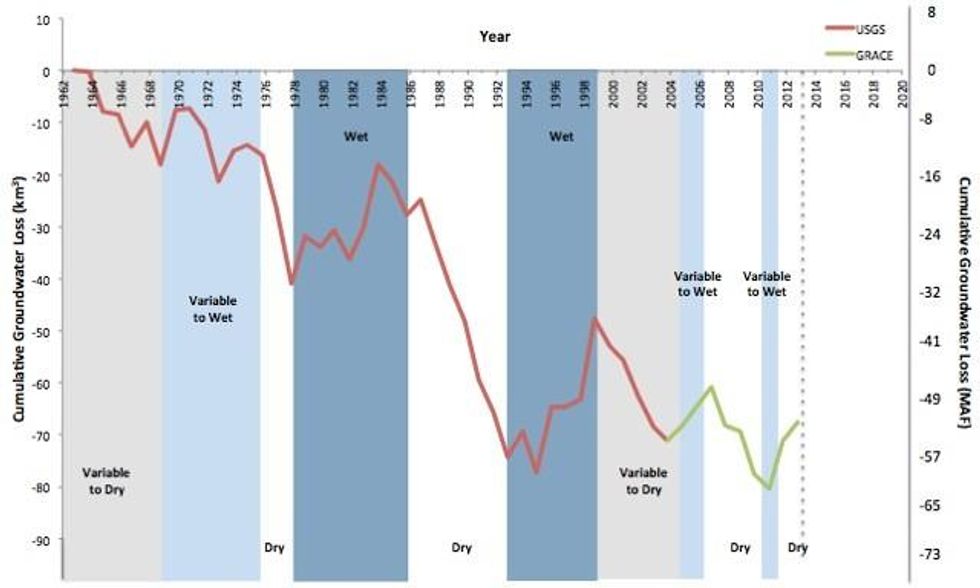Feb 05, 2014

"California is losing water reserves as if through a sieve," reports Circle of Blue, a water resources news site.
According to satellite data published Monday, the state has been unsustainably "guzzling" key groundwater reserves in the farming region in the Central Valley.
Analysis of NASA satellite data by researchers at the UC Center for Hydrologic Modeling reveals that "from when the current drought began in November 2011 through November 2013, the amount of water stored in the Sacramento-San Joaquin watershed, the state's largest, and in the Central Valley has dropped by 20 billion cubic meters (5.3 trillion gallons)."
Further, almost no rain or snow has fallen during the 2013-14 wet season, leaving snow pack at just 12 percent of normal levels, which Circle of Blue reports, means "there is little snow in the mountains to replenish depleted reservoirs during the spring melt."
Reacting to the news of the state's groundwater lows, 350.org founder Bill McKibben tweeted, "this is really bad news."
"It's scary," Anthony Willcutt, resident of the Brooktrails Township--one of the 17 communities officials estimate will run out of water in 100 days or less--toldUSA Today.
Further taxing groundwater resources, on Jan. 31, the state Water Resources Department announced that it was not allocating any water from the Sacramento-San Joaquin River Delta to 29 local water agencies serving 25 million people--the first time in state history--and was slashing deliveries to agricultural districts by half.
The LA Times reports that without these allocations, ranchers and farmers in the state are being pushed to tap groundwater resources "whose quality is rapidly deteriorating from overuse and a lack of rainfall to replenish them."
Further, the lack of water is forcing many to "liquidate herds" and leave hundreds of thousands of farmland acres fallow.
As USA Today reported Wednesday:
A foreboding is seeping across the state as Californians gaze on rain-starved reservoirs, parched pastures and arid orchards at the start of what could be the worst year of drought since the mid-1970s. Most at risk is the Golden State's $45 billion-a-year agriculture industry, producer of nearly half of U.S.-grown fruits, nuts and vegetables. Farmers plan to plant fewer acres and some farmworkers are leaving for greener fields. Other financial effects are piling up. Ranchers are thinning cattle herds. Ski resorts have laid off workers. The state's Forestry Department says forest fire calls were up sixfold last month from past Januarys.
Governor Jerry Brown warned last week that this spell may amount to one of history's great "mega-droughts."
"It's a borderline catastrophe," Ryan Jacobsen, chief executive of the Fresno County Farm Bureau, told the LA Times. "The impact is going to be very traumatic."
The U.S. Drought Monitor reported last week that 'exceptional drought'--the most severe category--now covered 9 percent of the state.

_____________________
Join Us: News for people demanding a better world
Common Dreams is powered by optimists who believe in the power of informed and engaged citizens to ignite and enact change to make the world a better place. We're hundreds of thousands strong, but every single supporter makes the difference. Your contribution supports this bold media model—free, independent, and dedicated to reporting the facts every day. Stand with us in the fight for economic equality, social justice, human rights, and a more sustainable future. As a people-powered nonprofit news outlet, we cover the issues the corporate media never will. Join with us today! |
Our work is licensed under Creative Commons (CC BY-NC-ND 3.0). Feel free to republish and share widely.
Lauren McCauley
Lauren McCauley is a former senior editor for Common Dreams covering national and international politics and progressive news. She is now the Editor of Maine Morning Star. Lauren also helped produce a number of documentary films, including the award-winning Soundtrack for a Revolution and The Hollywood Complex, as well as one currently in production about civil rights icon James Meredith. Her writing has been featured on Newsweek, BillMoyers.com, TruthDig, Truthout, In These Times, and Extra! the newsletter of Fairness and Accuracy in Reporting. She currently lives in Kennebunk, Maine with her husband, two children, a dog, and several chickens.

"California is losing water reserves as if through a sieve," reports Circle of Blue, a water resources news site.
According to satellite data published Monday, the state has been unsustainably "guzzling" key groundwater reserves in the farming region in the Central Valley.
Analysis of NASA satellite data by researchers at the UC Center for Hydrologic Modeling reveals that "from when the current drought began in November 2011 through November 2013, the amount of water stored in the Sacramento-San Joaquin watershed, the state's largest, and in the Central Valley has dropped by 20 billion cubic meters (5.3 trillion gallons)."
Further, almost no rain or snow has fallen during the 2013-14 wet season, leaving snow pack at just 12 percent of normal levels, which Circle of Blue reports, means "there is little snow in the mountains to replenish depleted reservoirs during the spring melt."
Reacting to the news of the state's groundwater lows, 350.org founder Bill McKibben tweeted, "this is really bad news."
"It's scary," Anthony Willcutt, resident of the Brooktrails Township--one of the 17 communities officials estimate will run out of water in 100 days or less--toldUSA Today.
Further taxing groundwater resources, on Jan. 31, the state Water Resources Department announced that it was not allocating any water from the Sacramento-San Joaquin River Delta to 29 local water agencies serving 25 million people--the first time in state history--and was slashing deliveries to agricultural districts by half.
The LA Times reports that without these allocations, ranchers and farmers in the state are being pushed to tap groundwater resources "whose quality is rapidly deteriorating from overuse and a lack of rainfall to replenish them."
Further, the lack of water is forcing many to "liquidate herds" and leave hundreds of thousands of farmland acres fallow.
As USA Today reported Wednesday:
A foreboding is seeping across the state as Californians gaze on rain-starved reservoirs, parched pastures and arid orchards at the start of what could be the worst year of drought since the mid-1970s. Most at risk is the Golden State's $45 billion-a-year agriculture industry, producer of nearly half of U.S.-grown fruits, nuts and vegetables. Farmers plan to plant fewer acres and some farmworkers are leaving for greener fields. Other financial effects are piling up. Ranchers are thinning cattle herds. Ski resorts have laid off workers. The state's Forestry Department says forest fire calls were up sixfold last month from past Januarys.
Governor Jerry Brown warned last week that this spell may amount to one of history's great "mega-droughts."
"It's a borderline catastrophe," Ryan Jacobsen, chief executive of the Fresno County Farm Bureau, told the LA Times. "The impact is going to be very traumatic."
The U.S. Drought Monitor reported last week that 'exceptional drought'--the most severe category--now covered 9 percent of the state.

_____________________
Lauren McCauley
Lauren McCauley is a former senior editor for Common Dreams covering national and international politics and progressive news. She is now the Editor of Maine Morning Star. Lauren also helped produce a number of documentary films, including the award-winning Soundtrack for a Revolution and The Hollywood Complex, as well as one currently in production about civil rights icon James Meredith. Her writing has been featured on Newsweek, BillMoyers.com, TruthDig, Truthout, In These Times, and Extra! the newsletter of Fairness and Accuracy in Reporting. She currently lives in Kennebunk, Maine with her husband, two children, a dog, and several chickens.

"California is losing water reserves as if through a sieve," reports Circle of Blue, a water resources news site.
According to satellite data published Monday, the state has been unsustainably "guzzling" key groundwater reserves in the farming region in the Central Valley.
Analysis of NASA satellite data by researchers at the UC Center for Hydrologic Modeling reveals that "from when the current drought began in November 2011 through November 2013, the amount of water stored in the Sacramento-San Joaquin watershed, the state's largest, and in the Central Valley has dropped by 20 billion cubic meters (5.3 trillion gallons)."
Further, almost no rain or snow has fallen during the 2013-14 wet season, leaving snow pack at just 12 percent of normal levels, which Circle of Blue reports, means "there is little snow in the mountains to replenish depleted reservoirs during the spring melt."
Reacting to the news of the state's groundwater lows, 350.org founder Bill McKibben tweeted, "this is really bad news."
"It's scary," Anthony Willcutt, resident of the Brooktrails Township--one of the 17 communities officials estimate will run out of water in 100 days or less--toldUSA Today.
Further taxing groundwater resources, on Jan. 31, the state Water Resources Department announced that it was not allocating any water from the Sacramento-San Joaquin River Delta to 29 local water agencies serving 25 million people--the first time in state history--and was slashing deliveries to agricultural districts by half.
The LA Times reports that without these allocations, ranchers and farmers in the state are being pushed to tap groundwater resources "whose quality is rapidly deteriorating from overuse and a lack of rainfall to replenish them."
Further, the lack of water is forcing many to "liquidate herds" and leave hundreds of thousands of farmland acres fallow.
As USA Today reported Wednesday:
A foreboding is seeping across the state as Californians gaze on rain-starved reservoirs, parched pastures and arid orchards at the start of what could be the worst year of drought since the mid-1970s. Most at risk is the Golden State's $45 billion-a-year agriculture industry, producer of nearly half of U.S.-grown fruits, nuts and vegetables. Farmers plan to plant fewer acres and some farmworkers are leaving for greener fields. Other financial effects are piling up. Ranchers are thinning cattle herds. Ski resorts have laid off workers. The state's Forestry Department says forest fire calls were up sixfold last month from past Januarys.
Governor Jerry Brown warned last week that this spell may amount to one of history's great "mega-droughts."
"It's a borderline catastrophe," Ryan Jacobsen, chief executive of the Fresno County Farm Bureau, told the LA Times. "The impact is going to be very traumatic."
The U.S. Drought Monitor reported last week that 'exceptional drought'--the most severe category--now covered 9 percent of the state.

_____________________
We've had enough. The 1% own and operate the corporate media. They are doing everything they can to defend the status quo, squash dissent and protect the wealthy and the powerful. The Common Dreams media model is different. We cover the news that matters to the 99%. Our mission? To inform. To inspire. To ignite change for the common good. How? Nonprofit. Independent. Reader-supported. Free to read. Free to republish. Free to share. With no advertising. No paywalls. No selling of your data. Thousands of small donations fund our newsroom and allow us to continue publishing. Can you chip in? We can't do it without you. Thank you.